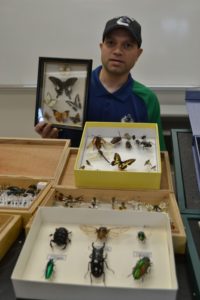Know Your Profs is an ongoing series of profiles on the instructors at Camosun College. Every issue we ask a different instructor at Camosun the same 10 questions in an attempt to get to know them a little better.
If you have an instructor you’d like to see interviewed in the paper, but perhaps you’re too busy to ask them yourself, email editor@nexusnewspaper.com and we’ll add them to our list of teachers to talk to.

This issue, we caught up with Biology prof David Raju to talk about keeping track of his hours, how he spends his free time, and his top-10 list of things he’d like to see in post-secondary.
1. What do you teach and how long have you been at Camosun?
I teach biology and have put in just over 88,000 man-hours, or two hours in mayfly hours, without missing a single hour of work. Not that I have too much time on my hands and am keeping track in all sorts of ways.
2. What do you personally get out of teaching?
When a student gives you the opportunity to work with them and trusts you by immersing themselves in the learning opportunities you provide for them, they have my utmost respect, since I believe what I’m doing is important and it tells me they feel the same way, which makes me feel like I’m serving some sort of purpose. As a bonus, it pays the bills for me and my two significant others, Wilma the water flea and Fred the flatworm. You’ll meet them if you take a biology course with me, but don’t worry—they’re not the kind of fleas and worms you Camosun students are all too familiar with.
3. What’s one thing you wish your students knew about you?
Although not always successful, I work very hard at my teaching so that students give a hoot while having a hoot in my biology courses. If you don’t believe me, just ask those students who had the courage to partake in my owl pellet lab, in which we dissected the pellets owls coughed up so that we could see what their diet consisted of. But don’t worry—just like my other labs and activities we do in my courses, there’s much more to them than simply regurgitating answers.
4. What’s one thing you wish they didn’t know about you?
That I’m not really that fungi—fun guy—they think I am, but rather only human, and I have ups and downs like they do; some days are tougher than others, some better than others. Ups when the Canucks win and downs when the Canucks lose.
5. What’s the best thing that’s happened to you as a teacher here?
When I’m called by my last name, because it reminds me of my old man, who shared my great love and respect for all things biology. It can’t get better than that, as far as I’m concerned! Not even obtaining another insect to add to my collection can compare to being called “Raju” by a student, co-worker, friend, parrot, or someone I just met.
6. What’s the worst thing that’s ever happened to you as a teacher here?
I believe that the final grade a student receives in a course in many ways is as representative of the teacher’s teaching as the student’s achievement, so when a student received a poor grade in a course of mine I went ape knowing I also failed. But, at the same time, I and the other students in the class can only help those who show.
7. What do you see in the future of post-secondary education?
My top-ten list in reverse order is: 10: Student educational costs decrease now that the only textbook required for all courses is no textbook, but rather access to the internet, and thus college campus bookstores are replaced by college campus iStores. 9: Students and teachers control technology; technology does not control them. 8: Teachers and students change their ways now that learning is at our fingertips. 7: Understanding takes priority over memorization. 6: Resource-based learning is the norm and exam-based learning the exception. 5: Students actively engaged, not passively present, in the learning process. 4: Competition between students is replaced by students working together, with teachers and administrators making the necessary changes so that all students can be successful. 3: Teachers become co-learners, and students become co-teachers, in the learning process. 2: Students laugh and learn in a stress-free environment. 1: Student, teacher, and insect numbers increase on all college campuses around the globe.
8. What do you do to relax on the weekends?
I don’t drink anymore but I still enjoy the atmosphere of nightclubs and pubs—people having fun and good music—possibly because I’m not a social butterfly, but rather like those I’m closest to and know the most about, those being the majority of insects, which are also solitary in nature. And so it’s a rush when I go out of my comfort zone every now and then before I go back to being my regular solitary, beastly self, who enjoys watching good and bad romantic comedies and well-done nature flicks, which, when you think about it, are really one and the same.
9. What is your favourite meal?
A bee-LT sandwich. Just kidding; I would never harm one of my best friends. My favourite meal is my mom’s version of rouladen, in which thin-sliced turkey instead of beef is wrapped around an egg instead of a pickle. I gobble the stuff up.
10. What’s your biggest pet peeve?
People who step on insects, people, and other living things, and feel no remorse for doing so.

